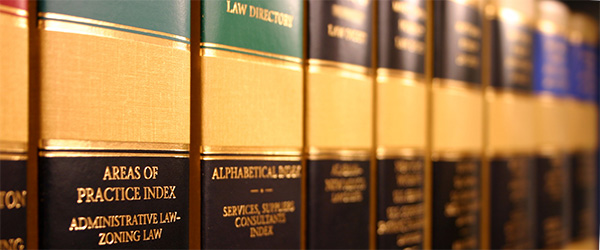Real Estate and Land Use Law
Real estate law concerns the title transfer and the financing aspects of land used in large scale projects, such as apartments, condominiums, traditional subdivisions, planned unit developments, shopping centers, and industrial parks. Real estate law is generally divided between two areas: residential and commercial.
Land use law, on the other hand, has a narrower focus: the use and development of public and private real estate, such as zoning, easements, trespassing, and eminent domain. With both real estate and land use law, there is a significant overlap with corporate law generally, as well as environmental and energy law. In both fields, attorneys must be able to work with state and local officials.
In the private sector, real estate and land use lawyers are found in a law firm of any size, from solo practice and specialty boutique firms to large global law firms. Most residential real estate law is handled by small firms, while large law firms usually represent commercial projects, which typically entail environmental, land use, and zoning questions. In the public sector, real estate and land use lawyers work for government agencies, as well as local and county governments.
Courses
Courses designated as "primary" are foundational, while those listed as "secondary" contain relevant and related content. "Co-curricular" courses are credit-bearing extra-curricular activities, while "experiential" courses are practice-based offerings. Please keep in mind that the focus of any course will vary depending on the instructor.
Primary Courses
150: Property 4 credits PRIMARY
Introduction to basic concepts and principles of Anglo-American law as they relate to personal and real property.
257: Business Drafting 2 credits PRIMARY
This course focuses on legal drafting in the business setting. Students will be required to draft and evaluate typical documents including corporate documents, loan and purchase contracts, partnership agreements, and employment agreements.
258: Contracts and Commercial Transactions 2 or 3 credits PRIMARY
This "best practices" course introduces students to commercial law and to the structuring, negotiation, drafting, and review of common commercial agreements. These agreements include: (1) non-disclosure and confidentiality agreements, (2) employment agreements, (3) services agreements, (4) agreements for the sale of goods, and (5) lending and security agreements. In addition to exploring applicable law and theory, students analyze, draft, redline, and actively discuss actual commercial contracts. In so doing, students explore both the specific effects of various contractual provisions and the potential broader commercial implications of such provisions. If not taken to satisfy LAWR III, this course will also satisfy the Experiential Learning requirement. This course is a writing course with no exam. Contracts I and II are prerequisites.
262: Real Estate Drafting 2 credits PRIMARY
This course is designed to satisfy LAWR III. It is geared to teach drafting from the point of view of a commercial real estate attorney. In this context, drafting includes both drafting your own documents, as wells as re-drafting documents submitted to you by other parties (including how to spot issues when re-drafting a document). The types of real estate documents that will be covered include a broad sampling of purchase contracts, leases, loan documents, and deeds/easements. The class will review core concepts of real estate law that must be considered in drafting a binding and enforceable real estate contract.
408: Commercial Leasing 2 credits PRIMARY
This course focuses on the negotiation and drafting of commercial real estate leases from the initial letter of intent stage to the final lease closing. Items studied and drafting exercises include: (1) letters of intent, (2) brokerage agreements, (3) commercial leases and lease provisions at various levels of the negotiation process, (4) subordination, nondisturbance, and attornment agreements, (5) estoppel certificates, and (6) lease memoranda. The course covers various forms of commercial leases, including ground leases, retail leases, subleases, and license and occupancy agreements. This course also focuses on professionalism and ethics in the negotiation and drafting process. In addition to learning applicable law, students receive regular evaluations of substantial drafting and negotiation assignments typical of those encountered in actual practice. The negotiation and drafting skills learned in this course apply to other areas of commercial practice. P-LAW 111.
471: Real Estate Finance 2 credits PRIMARY
Covers the different ways to get a commercial project financed by securing a loan with real estate. As with other contracts, the form of the loan and the real estate serving as collateral vary from deal to deal and, depending upon the type of loan, may or may not be negotiable. This course will teach the fundamentals of real estate loans, including notes, mortgages/deeds of trust, different types of loans, ancillary loan documents, loan commitments, due diligence for loans, opinions on title, and opinions on the validity of loan documents, default and foreclosure, and ethics opinions in loan transactions. Real Estate Finance will include federal and North Carolina laws. The course will look at what happens when things go wrong, such as defective mortgages, failure of consideration, and documentation errors. Real Estate Finance will teach the practical aspects of commercial real estate, including how to interpret and negotiate loan documents, depending upon whether you represent the interests of the lender or the borrower. Examples from actual closings will be used to see what life as a commercial real estate lawyer is like. The skills learned in this class will benefit students contemplating a career in real estate transactions as well as business transactions.
474: Real Estate Development 2 credits PRIMARY
Focuses on representing clients in a commercial real estate practice. The class will follow a commercial project from site selection through development, financing, and completion of construction. The course will include the steps, from start to finish, on how to represent developers as clients. It will cover getting land under contract, due diligence, financing, negotiating leases, options and eventual sale to an investor. The skills in this class would easily transfer to any transactional practice. Real Estate Development is a companion course to Real Estate Finance, although you can take one course without the other.
512: Environmental Law 2 or 3 credits PRIMARY
This course will help you understand modern environmental law - its genesis, its strengths, and its weaknesses - and how you can use it, and perhaps shape it, in your career. After covering basic principles of constitutional and administrative law as they apply to environmental regulation, the course focuses on the major federal environmental statutes, including the National Environmental Policy Act, the Endangered Species Act, the Clean Air Act, and the Clean Water Act. The course uses actual case examples to illustrate major concepts.
536: Land Use Regulation and Planning 2 or 3 credits PRIMARY
A study of the public regulation of land use and its alternatives. The primary focus is on the scope of the police power in the zoning process.
616: Housing Law and Policy 2 credits PRIMARY
Introduces U.S. housing law and policy with a focus on low and moderate income tenants as well as homeowners. Examines the history of housing policies and problems, public housing and federally subsidized housing, habitability and code enforcement, foreclosure, gentrification, eviction, and fair housing law. Students will develop an understanding of the legal, social, and historic underpinnings of contemporary housing challenges, and how these insights inform advocacy strategies to promote housing justice.
Secondary Courses
296: Investments for Lawyers 1 credit SECONDARY
This seminar provides an introduction to a range of investments that lawyers may encounter in a legal practice. Investments discussed during the course will include equities (preferred and common), fixed income securities (corporate and government), real estate, private investment companies (hedge funds, venture capital funds, private equity funds, and real estate funds), registered investment companies (mutual funds and ETFs), options, futures, and rights and warrants. The course will not provide an in-depth discussion of the taxation of these investments.
306: Estates and Trusts 3 or 4 credits SECONDARY
A study of the descent of property by operation of wills and intestacy and the nature, creation, and elements of a trust.
403: Conflict of Laws 3 credits SECONDARY
A study of the choice of law rules applicable where at least one of the operative issues in a case is connected with some state or country other than the one in which suit is brought at the national level or the international level; jurisdiction of courts over persons, things, and property in the national and transnational context; recognition and enforcement of judgments on the national and international levels; business and estate planning issues in law in different jurisdictions. (although this course is traditionally known as conflict of laws in the United States, it is known as private international law elsewhere)
439: Funeral and Cemetery Law 2 or 3 credits SECONDARY
This course focuses on the laws regarding the status, treatment, and disposition of human remains. We are in the midst of a "death revolution" in the United States - cremation rates are rising fast and traditional funeral service providers are under stress. This course examines these trends and the role that the law is playing in shaping and responding to social norms and economic realities. Students will engage in significant legal research and writing in this course, "representing" a non-traditional funeral services provider and analyzing the provider's ability to operate under existing laws.
479: Creditors' Rights and Basic Bankruptcy 4 credits SECONDARY
Almost every civil law course in law school is about reciprocal rights and duties between parties and liability for breach. Almost none of these courses covers law concerning how this liability is enforced, that is, how the injured party collects (usually damages) from the injuring party.
Enforcing liability is a separate area of law that is often labeled debtors’ rights and creditors’ remedies. It’s an umbrella subject that includes the state law means for creditors to enforce liability. The subject is often called creditors’ remedies and is mainly state law.
The state law of creditors remedies includes creditors with liens and creditors without liens. In most situations involving substantial contract credit, the creditor will acquire a lien by “consent.” If the collateral – the property subject to the lien – is personal property, Article 9 applies, which explains why we have a course called secured transaction which is really UCC Article 9. If the collateral is real property, different law applies which explains why we have courses related to real estate finance.
But fortuitous creditors – such as employees and tort victims and many other categories of fortuitous creditors don’t acquire consensual liens These creditors are known as unsecured creditors. A disparate bunch of state laws and a very few federal non-bankruptcy laws give them by default (bv operation of law) remedies against the person who wronged them.
This course covers these default, state law remedies of unsecured creditors and shows how this area of law fits with secured transactions and real estate finance.
The course also introduces bankruptcy to which many, many debtors – individuals and legal entities – eventually seek protection from creditors’ state law remedies. The course covers forms of bankruptcy (Chapter 7 and 13) most often pursued by individuals, sole proprietorships, and SMBs and introduces and provides a foundation for studying Chapter 11, which is mainly the home to large corporate debtors seeking to reorganize and continue business.
Thus, this course sets the stage for further, in-depth study of large business bankruptcies which –standing alone -- is very, very important, broad, and fascinating subject triggering incredibly important social issues and challenging, new constitutional issues. And it therefore meshes perfectly with the separate course in Corporate Bankruptcy.
The two courses are very different but entirely complimentary and cumulative. They are not duplicative. They are interlocking. And whatever piece or part of bankruptcy law is studied, you cannot fully understand any of it without understanding the state law of creditors’ remedies against which bankruptcy is, in large part, a reaction.
508: Family Law 3 credits SECONDARY
An exploration of how laws address family relationships: the rights and responsibilities of family members to each other, the rights and responsibilities of family members to third parties, and how these rights and responsibilities are enforced at divorce. Special attention will be paid to the family law issues arising most frequently in a family law practice – asset and liability division, alimony, child support, child custody, and modification of prior orders.
509: Insurance Law 2 or 3 credits SECONDARY
In the words of one author, "Insurance ideas and practices define central privileges and responsibilities within a society. In that sense, our insurance arrangements form a material constitution, one that operates through routine, mundane transactions that nevertheless define the contours of individual and social responsibility. For that reason, studying who is eligible to receive what insurance benefits, and who pays for them, is as good a guide to the social compact as any combination of Supreme Court opinions.” Accordingly, this course will cover an array of insurance law issues, including contract law foundations, insurance regulation, first-party insurance (including life, property, and disability), and liability insurance (including its implication on tort law), always keeping in mind the broader societal implications of insurance as a risk- and cost-spreading device.
510: State and Local Government 2 credits SECONDARY
A study of the law of state and local government, legislative and municipal process, bill drafting, and interest groups. Guest speakers include state and local legislators, mayors, and elected officials. Study of the role of the lawyer in public process and representation.
516: Secured Transactions 3 credits SECONDARY
A study of Articles 9 and 6 of the Uniform Commercial Code (UCC), which apply to transactions in which a debtor borrows money from a creditor and grants to the creditor a security interest in the personal property of the debtor to secure the debtor's promise to repay the loan.
517: Sales, Leases, Transactions and International Sales 3 credits SECONDARY
A study of Article 2 of the Uniform Commercial Code (UCC) , which applies to sales or transactions in goods, and related topics.
530: Natural Resources Law 2 credits SECONDARY
Our economy, livelihoods, and society rest upon natural resources. This course explores the legal and policy norms for owning, managing, and stewarding natural resources such as land, ocean, wildlife, forests, minerals, oil and gas, and our climate. We will also study how the U.S. manages the recreational and spiritual values of our natural resources.
543: Banking Law 2 credits SECONDARY
The study of American banking laws and regulations taught from a historical standpoint from pre-colonial times to the present.
Experiential Courses
345: Semester in Practice 10 or 11 credits EXPERIENTIAL
This is the field placement component of a full term externship program and is paired with the Externship Lecture course. Total credits between Semester in Practice and Externship Lecture will total 13. The number of credit hours awarded to an individual student will determine the hours of work required at the field placement and meet or exceed the ABA standards. In accordance with ABA guidelines, students work at a placement under a supervising attorney. C-LAW 300.
358: Medical-Legal Partnership Clinic I 4 credits EXPERIENTIAL
This experiential clinic course focuses on the attainment of fundamental lawyering skills through direct client representation and advocacy, with a particular emphasis on problem solving and legal remedies to address health-harming legal needs. Through collaboration with healthcare providers, students will identify legal issues that negatively contribute to the health of low-income patient-clients and develop a comprehensive, interprofessional strategy to overcome barriers to health justice. Seminar topics educate students about fundamental lawyering skills and substantive law essential for the cases students will work on over the course of their time in the clinic.
367: Environmental Law and Policy Clinic I 4 credits EXPERIENTIAL
This course allows students to develop their professional skills while working on matters related to environmental law and policy and heirs' property (a form of joint ownership of land). Each student will work on an environmental matter with an organizational client and a property matter with a family client to seek to preserve ancestral lands. The course provides a combination of intensive training on the
skills needed to work with clients and grappling with environmental law and policy matters with which clients need help. During the course of the semester, a weekly, two-hour class meeting will build upon these skills and include meeting with practitioners from industry, private practice, government, and non-profits. In addition, this weekly meeting will serve as a touch-point for learning and sharing with other students how their representation of clients is progressing, what concerns and issues are arising, and what learnings they are taking away. Students will be expected to put 10-12 hours of effort into the clinic per week in keeping with the 4 credit requirement. They will keep timesheets and a journal of their experience.
676: Summer Externship 4 credits EXPERIENTIAL
This course is currently available only in the summer. The director of the externship designates one or more cities in North and South Carolina, usually including Charlotte, NC, and offers the students externships in a designated practice area. The practice areas vary from summer to summer. Students meet weekly with the director to integrate and apply the doctrinal insights received elsewhere in the law school curriculum and in the subject matter of the field placements.
Faculty
The following faculty are knowledgeable about the topic and may be a useful resource for you.

Professor of Law

Professor of Law

Professor of Law

Professor of Practice


